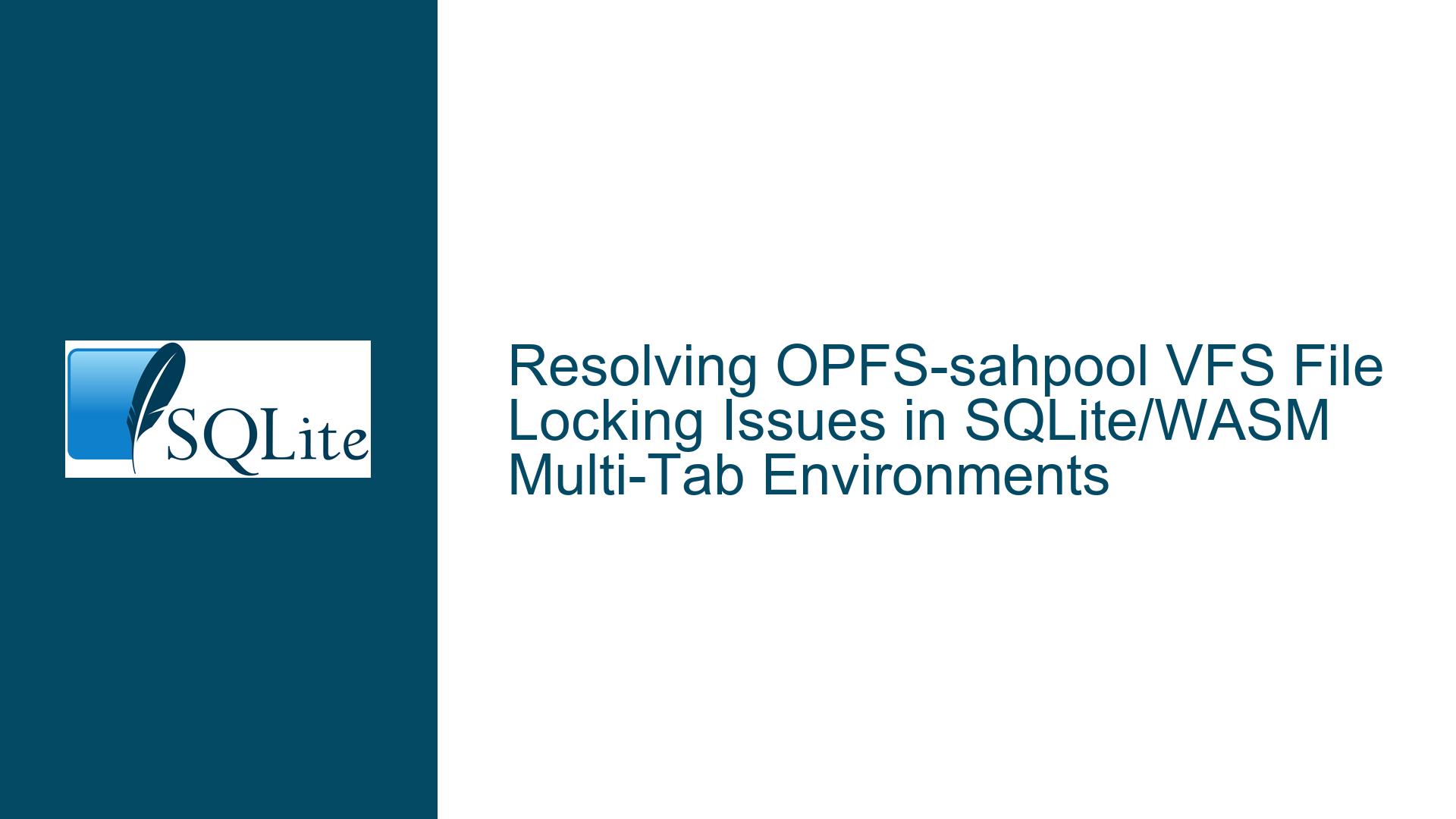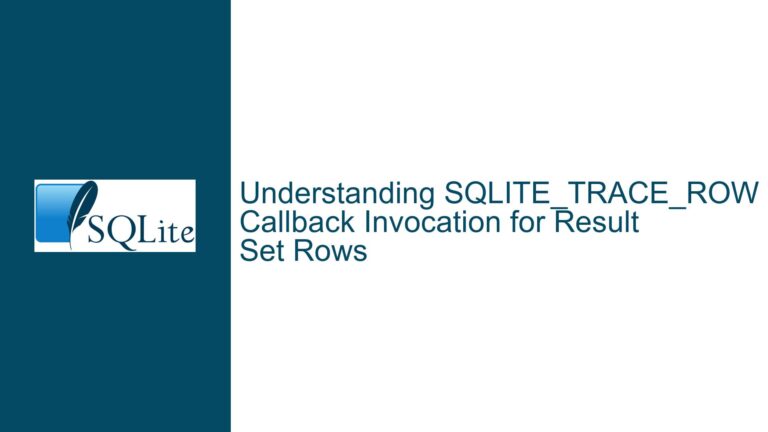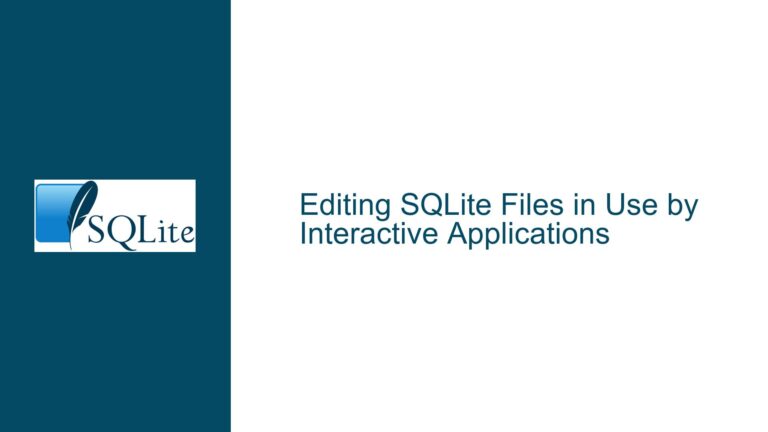Resolving OPFS-sahpool VFS File Locking Issues in SQLite/WASM Multi-Tab Environments
OPFS-sahpool VFS File Lock Retention After Worker Termination in Multi-Tab Contexts
Issue Overview: Persistent File Handle Locks Despite Worker Termination
When using SQLite/WASM with the OPFS-sahpool VFS (Storage Access Handle Pool Virtual File System) in multi-tab browser environments, developers may encounter persistent file locking issues even after terminating the Web Worker responsible for managing database operations. The core problem manifests as errors during SQLite/WASM initialization in a new Worker due to unreleased file locks from a prior terminated Worker. A representative error message is:
Access Handles cannot be created if there is another open Access Handle or Writable stream associated with the same file.
This error indicates that the browser’s Origin Private File System (OPFS) retains exclusive locks on SQLite database files after a Worker is terminated, preventing subsequent Workers from acquiring new FileSystemSyncAccessHandle instances. The OPFS-sahpool VFS is designed for high-performance single-Writer scenarios but explicitly disclaims support for multi-tab concurrency. However, even in single-Writer setups where only one tab is active at a time, locks may persist for several seconds after Worker termination due to browser-specific resource cleanup behaviors. This creates a race condition where rapid tab/window reloads or Worker restarts trigger sporadic initialization failures, potentially crashing the application.
The issue is exacerbated by three factors:
- Browser-Specific Lock Release Timing: Chromium-based browsers (Chrome, Edge) may delay releasing OPFS file handles for up to 10 seconds after a Worker terminates.
- Lack of Synchronization Between Web Locks and OPFS Locks: If Web Locks API-based coordination is implemented only in the main thread (tab context) and not within the Worker, termination of the Worker via
Worker.terminate()may not guarantee immediate release of OPFS locks. - OPFS-sahpool VFS Design Limitations: This VFS prioritizes performance over concurrency by retaining
FileSystemSyncAccessHandleinstances in a pool, which complicates graceful lock release during abrupt Worker termination.
Developers expecting deterministic lock release upon Worker termination will find this behavior counterintuitive, as the browser’s internal handling of OPFS resources is opaque and asynchronous. The problem is particularly acute in applications requiring high availability of database access across tab reloads or rapid user-driven context switches.
Potential Causes of File Handle Lock Retention in OPFS-sahpool VFS
Browser-Specific OPFS Resource Cleanup Delays
Browsers implement OPFS file handle management differently, with Chromium-based browsers exhibiting delayed release of FileSystemSyncAccessHandle locks. When a Worker is terminated via Worker.terminate(), the browser’s internal garbage collection mechanism does not synchronously close OPFS file handles. Instead, handles are released asynchronously, leading to a window where new Workers attempting to access the same files will fail with "file locked" errors. This behavior is not documented in the WHATWG File System Access Standard, leaving developers dependent on empirical observations and browser-specific workarounds.
Improper Coordination Between Web Locks and Worker-Side OPFS Handles
A common anti-pattern is acquiring Web Locks (via navigator.locks.request()) in the main thread (tab context) to coordinate database access across tabs but failing to synchronize these locks with the Worker’s internal OPFS handle lifecycle. For example:
// Main thread (tab)
async function initWorker() {
await navigator.locks.request('db-lock', async () => {
const worker = new Worker('db-worker.js');
// ... use worker ...
worker.terminate(); // Terminate before releasing lock
});
}
Here, the Web Lock is released after the Worker is terminated, but the Worker’s OPFS file handles may still be held by the browser. Since the lock release in the main thread is not atomically tied to the Worker’s handle closure, a new Worker may attempt to acquire handles before the browser has cleaned up the previous ones.
OPFS-sahpool VFS Handle Pooling and Lack of Unlock-ASAP Semantics
The OPFS-sahpool VFS maintains a pool of FileSystemSyncAccessHandle instances to minimize the overhead of acquiring/releasing handles during frequent I/O operations. While this improves performance, it increases the likelihood of handles remaining open longer than necessary. Unlike the non-pooled OPFS VFS (which can be configured with opfs-unlock-asap=1 to release handles immediately after each operation), the pooled variant does not support this flag, leaving developers without a built-in mechanism to force prompt handle release.
Mitigation Strategies and Workarounds for OPFS-sahpool Lock Contention
Implement Web Lock Coordination Within the Worker Context
To ensure OPFS file handles are released before Web Locks are relinquished, acquire and manage locks inside the Worker itself, not just the main thread. This guarantees that the Worker’s termination (triggered by releasing the Web Lock) occurs only after all OPFS handles are closed. Example:
Main Thread (Tab):
async function startWorker() {
const worker = new Worker('db-worker.js');
worker.postMessage({ cmd: 'acquireLock' });
worker.onmessage = (e) => {
if (e.data === 'lockAcquired') {
// Worker has OPFS handles open; safe to proceed
}
};
}
Worker Script (db-worker.js):
self.onmessage = async (e) => {
if (e.data.cmd === 'acquireLock') {
await navigator.locks.request('db-lock', async () => {
// Initialize OPFS-sahpool VFS and open handles here
self.postMessage('lockAcquired');
// Keep worker alive until lock is released
});
}
};
This approach ties the Web Lock’s lifetime directly to the Worker’s handle ownership. Terminating the Worker before releasing the lock (as in the original setup) is avoided; instead, the Worker remains active until the lock is explicitly released, ensuring handles are closed synchronously.
Retry-AccessHandle-Creation with Exponential Backoff
When sporadic lock contention cannot be fully eliminated (e.g., due to browser-specific delays), implement a retry mechanism with exponential backoff when initializing the OPFS-sahpool VFS:
async function openDatabaseWithRetry(maxRetries = 5) {
let attempt = 0;
while (attempt < maxRetries) {
try {
const db = await sqlite3.open_v2('mydb', 'opfs-sahpool');
return db;
} catch (e) {
if (e.message.includes('another open Access Handle')) {
const delay = Math.pow(2, attempt) * 100;
await new Promise(resolve => setTimeout(resolve, delay));
attempt++;
} else {
throw e;
}
}
}
throw new Error('Failed to open database after retries');
}
This pattern mitigates transient lock retention by the browser, though it introduces latency during initialization. Adjust the maxRetries and base delay according to observed browser cleanup times (e.g., 2–5 seconds for Chrome).
Fallback to Non-Pooled OPFS VFS with Unlock-ASAP Flag
If concurrency requirements outweigh performance needs, switch to the non-pooled OPFS VFS and enable the opfs-unlock-asap=1 flag. This forces the VFS to release OPFS handles immediately after each operation, reducing the window for lock conflicts:
const db = await sqlite3.open_v2('mydb', 'opfs', {
vfsFlags: 'opfs-unlock-asap=1'
});
While this degrades throughput for high-I/O workloads, it improves concurrency tolerance. Benchmarking is required to assess whether the performance trade-off is acceptable for your application.
Monitor Browser Support for readwrite-unsafe Access Handle Mode
Chrome 121+ introduces a readwrite-unsafe mode for FileSystemSyncAccessHandle creation, which disables locking entirely. While the SQLite team has deferred support for this due to its Chrome-only status, developers can experimentally patch the OPFS-sahpool VFS to use this mode:
Patch Example (Modify VFS Implementation):
// Override handle creation in the OPFS-sahpool VFS
const originalCreateHandle = sqlite3.oopfs.createAccessHandle;
sqlite3.oopfs.createAccessHandle = async (file) => {
try {
return await file.createSyncAccessHandle({ mode: 'readwrite-unsafe' });
} catch (e) {
// Fallback to standard mode if unsupported
return originalCreateHandle(file);
}
};
WARNING: This patch voids concurrency guarantees and risks data corruption if multiple Writers coexist. Only use it in single-Writer environments with Chrome-specific feature detection.
Architectural Workaround: Dedicated Worker Host with SharedWorker or ServiceWorker
For long-lived database sessions, replace per-tab Web Workers with a SharedWorker or ServiceWorker that outlives individual tabs. This avoids repeated handle acquisition/release cycles:
// main.js (all tabs)
const worker = new SharedWorker('db-shared-worker.js');
worker.port.start();
// db-shared-worker.js
let db;
self.onconnect = (e) => {
const port = e.ports[0];
port.onmessage = async (event) => {
if (!db) {
db = await sqlite3.open_v2('mydb', 'opfs-sahpool');
}
// Handle queries via port.postMessage()
};
};
This approach centralizes OPFS handle ownership in a single Worker shared across tabs, eliminating tab-specific lock contention. However, SharedWorker has limited browser support (not available in Safari), and ServiceWorker requires HTTPS and complicates database lifecycle management.
This guide provides a comprehensive toolkit for diagnosing and resolving OPFS-sahpool VFS lock retention issues, balancing immediate workarounds with long-term architectural adjustments. Developers must weigh performance, concurrency, and browser compatibility requirements when selecting a strategy.





